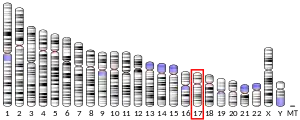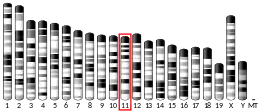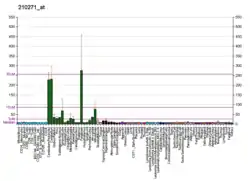NEUROD2
Neurogenic differentiation factor 2 is a protein that in humans is encoded by the NEUROD2 gene.[5][6]
Function
This gene encodes a member of the neuroD family of neurogenic basic helix-loop-helix (bHLH) proteins. Expression of this gene can induce transcription from neuron-specific promoters, such as the GAP-43 promoter, which contain a specific DNA sequence known as an E-box. The product of the human gene can induce neurogenic differentiation in non-neuronal cells in Xenopus embryos, and is thought to play a role in the determination and maintenance of neuronal cell fates.[6]
Interactions
NEUROD2 has been shown to interact with Protein kinase N1.[7]
References
- GRCh38: Ensembl release 89: ENSG00000171532 - Ensembl, May 2017
- GRCm38: Ensembl release 89: ENSMUSG00000038255 - Ensembl, May 2017
- "Human PubMed Reference:". National Center for Biotechnology Information, U.S. National Library of Medicine.
- "Mouse PubMed Reference:". National Center for Biotechnology Information, U.S. National Library of Medicine.
- Tamimi RM, Steingrimsson E, Montgomery-Dyer K, Copeland NG, Jenkins NA, Tapscott SJ (Mar 1997). "NEUROD2 and NEUROD3 genes map to human chromosomes 17q12 and 5q23-q31 and mouse chromosomes 11 and 13, respectively". Genomics. 40 (2): 355–7. doi:10.1006/geno.1996.4578. PMID 9119405.
- "Entrez Gene: NEUROD2 neurogenic differentiation 2".
- Shibata H, Oda H, Mukai H, Oishi K, Misaki K, Ohkubo H, Ono Y (Dec 1999). "Interaction of PKN with a neuron-specific basic helix-loop-helix transcription factor, NDRF/NeuroD2". Brain Research. Molecular Brain Research. 74 (1–2): 126–34. doi:10.1016/S0169-328X(99)00273-9. PMID 10640683.
Further reading
- McCormick MB, Tamimi RM, Snider L, Asakura A, Bergstrom D, Tapscott SJ (Oct 1996). "NeuroD2 and neuroD3: distinct expression patterns and transcriptional activation potentials within the neuroD gene family". Molecular and Cellular Biology. 16 (10): 5792–800. doi:10.1128/mcb.16.10.5792. PMC 231580. PMID 8816493.
- Kume H, Maruyama K, Shinozaki K, Kuzume H, Obata K (Sep 1998). "Phosphorylation and spatiotemporal distribution of KW8 (NDRF/NeuroD2), a NeuroD family basic helix-loop-helix protein". Brain Research. Molecular Brain Research. 60 (1): 107–14. doi:10.1016/S0169-328X(98)00176-4. PMID 9748526.
- Kitamura T, Miyachi T, Nakamura S, Kawakami H (Apr 1999). "Identification and analysis of the promoter region of the human NeuroD-related factor (NDRF)1". Biochimica et Biophysica Acta (BBA) - Gene Structure and Expression. 1445 (1): 142–7. doi:10.1016/s0167-4781(99)00038-x. PMID 10209266.
- Shibata H, Oda H, Mukai H, Oishi K, Misaki K, Ohkubo H, Ono Y (Dec 1999). "Interaction of PKN with a neuron-specific basic helix-loop-helix transcription factor, NDRF/NeuroD2". Brain Research. Molecular Brain Research. 74 (1–2): 126–34. doi:10.1016/S0169-328X(99)00273-9. PMID 10640683.
- Cousin P, Billotte J, Chaubert P, Shaw P (Jan 2000). "Physical map of 17p13 and the genes adjacent to p53". Genomics. 63 (1): 60–8. doi:10.1006/geno.1999.6062. PMID 10662545.
- Franklin A, Kao A, Tapscott S, Unis A (Nov 2001). "NeuroD homologue expression during cortical development in the human brain". Journal of Child Neurology. 16 (11): 849–53. doi:10.1177/08830738010160111201. PMID 11732772. S2CID 20069074.
- Westerman BA, Poutsma A, Maruyama K, Schrijnemakers HF, van Wijk IJ, Oudejans CB (Apr 2002). "The proneural genes NEUROD1 and NEUROD2 are expressed during human trophoblast invasion". Mechanisms of Development. 113 (1): 85–90. doi:10.1016/S0925-4773(01)00665-7. PMID 11900979. S2CID 11607202.
- Westerman BA, Chhatta A, Poutsma A, van Vegchel T, Oudejans CB (Jan 2004). "NEUROD1 acts in vitro as an upstream regulator of NEUROD2 in trophoblast cells". Biochimica et Biophysica Acta (BBA) - Gene Structure and Expression. 1676 (1): 96–103. doi:10.1016/j.bbaexp.2003.10.002. PMID 14732494.
- Zill P, Büttner A, Eisenmenger W, Bondy B (Jun 2006). "A possible impact of the neuroD2 transcription factor on the development of drug abusing behavior". Molecular Psychiatry. 11 (6): 525–7. doi:10.1038/sj.mp.4001825. PMID 16607387.
External links
- NEUROD2+protein,+human at the U.S. National Library of Medicine Medical Subject Headings (MeSH)
This article incorporates text from the United States National Library of Medicine, which is in the public domain.




